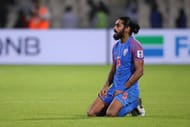India fought. India defended. India gave their lives on the pitch at the Sharjah Stadium. In a cruel twist of fate, Jamal Rashed's 90th-minute penalty consigned the Blue Tigers to a 1-0 loss, and knocked them out of the AFC Asian Cup 2019.
It was a deserved victory for Bahrain, they pushed and pushed. They failed to break down the brickwall that the Indian defence was, until they were lent a helping hand by the unfortunate Pronay Halder, who brought down Hamad Al Shamsan in the box to give Rashed the opportunity to slot home from the penalty spot.
Here are five big points of discussion from a sombre night for Indian Football.
#1 India's tactics were all wrong
It is the most basic cliche in world football that a team never plays for a daw. Most often, setting your team up for a draw only leads to a disastrous ending. Often, it is not as heartbreaking as tonight was for Indian football in the circumstances, but it was a huge mistake from Stephen Constantine to take away the attacking endeavour almost altogether.
India's biggest positive to come out of the first two games was that they always gave their opponents something to think about at both ends of the pitch. The counter-attacking threat coupled with a compact defence is a superb combination.
Tonight, India had only a compact defence. Udanta Singh and Halicharan Narzary were used as auxiliary full-backs. Sunil Chhetri, Ashique Kuruniyan and Jeje Lalpekhlua were only chasing down hopeless hoofs from back to front. In the absence of Anirudh Thapa, India had no one to knit their counter-attacking play together.
Rowllin Borges has his own strengths, but India needed the Thapa ilk of player tonight more than the Borges kind. Despite India's defensive heroics on the night, in the second half, it felt like a matter of time before Bahrain would break them down, given the intensity of continuity of the attacks.
The ball was just boomeranging back into India's defensive third within a matter of seconds, and that was going to tell at some point.
When it did, it was the unfortunate skipper on the night whose indiscretion led to a penalty being awarded, and Rashed made no mistake.
#2 Sandesh Jhingan the warrior

If there was one player on the pitch that didn't deserve to lose, it was India's centre-back. My word, he was outstanding! Mohamed Al Romaihi came, he was met by Jhingan. Abdullah Yusuf came, he was met by Jhingan. Sami Al Husaini came, he was met by Jhingan.
He didn't deserve to lose that game. It didn't even start on a good note for him, as it took all of two minutes for him to lose his trusted lieutenant at the heart of the defence, with Anas Edathodika having to go off with a knee problem.
Jhingan goaded, coaxed, bellowed at Salam Ranjan Singh, and got the youngster to do his side of defensive work as well. But even that was secondary.
On what was a sad night for Indian football, Jhingan can walk off with his head held high. He was brave in the aerial duels, he was perfect with the timing of his tackles, he knew when to step up and attack the Bahraini attackers, he knew when to drop off and afford them respect.
It was flawless. It's a word that gets thrown around rather often in the footballing context, but that truly was a flawless performance from Jhingan. Pity about the result, but one thing's for sure, he's here to stay. As if he wasn't already.
#3 Bahrain's substitutions were spot on

In the second half, it was visible that the Bahrainis were getting a little desperate and it was understandable why they would be.
Miroslav Sukup needed his side to calm down, and he played his role in bringing that calm to the side. He brought on his best striker Abdullah Yusuf in the second-half as the second counter-intuitive change of the day.
He took off two of Bahrain's best players in the tournament - Al Romaihi and Ali Madaan, because he wanted more calm and composure in their attacking play. And more than Yusuf, it was Sukup's first substitute that made the largest difference to proceedings.
Mohammed Marhoon started the game against Thailand and wasn't all that spectacular, and lost his place in the side to Jamal Rashed, but he came on, and with him, came the relentlessness and method in the Bahraini attack.
Until then, it was all a little too lacklustre from Bahrain. Their only way of attacking seemed to be to get the ball into the box in any way, shape or form. Marhoon came on, and his movement immediately caused India problems. He was running in behind the defence, drifting across the width of the pitch, and suddenly India had a big problem to deal with.
It was largely the same with Yusuf. He brought calm, replacing Al Romaihi's flustered intent. Bahrain kept possession more in the final third, they were more effective in finding gaps, they really couldn't have done more than they did in trying to find that goal.
#4 India's valiant players let down by their manager

The moment where it all unravelled talk coming into the game was about India being fitter - 20% better aerobically, than during the Intercontinental Cup in June, they said.
India's players showed that on the pitch. To a man, every single one of them ran himself to the ground. They threw themselves at Bahraini feet, Gurpreet Singh Sandhu extended himself as far as his massive frame would take him. They almost succeeded in lasting the length of a whole football match without letting the ball into their own net.
But that was never a wise ploy to begin with. India just had no out-ball, and that meant that apart from having to defend superbly, they would have to have no lapses in concentration, which was always going to be difficult in the face of a barrage of Bahraini attacks.
India's out-ball was the long-kick from Gurpreet Singh Sandhu to the striker. Sunil Chhetri is 5'7", Jeje Lalpekhlua isn't much taller, Ashique Kuruniyan isn't even a striker. So, to expect them to excel at holding up the ball against two six-footers at the heart of the Bahraini defence was just foolhardy.
As they say in football, you can be as fit as you can, you can have as much desire and work-rate as you can, in the end, it will always be the additional bit of quality that triumphs.
#5 Stephen Constantine's era ends in an apt manner

In his last game as manager of India, Stephen Constantine's India really stuck to the blueprint of his last four years in charge of this side.
Don't get this wrong, the Englishman has improved this team. He has made it incredibly hard for opponents to beat this side. He has made India a bunch of fighters, a bunch of scrappers, a bunch who won't collapse even when things aren't going their way.
In a nutshell, tonight was the Constantine era. Why? Because the large takeaway from the Constantine era has been the lack of quality and nous. The large takeaway from the Constantine era has been the emphasis on workhorses, who sometimes treat that little round thing like a hot potato.
Stephen Constantine tried, he took India as far as he could. But it was only so far.
